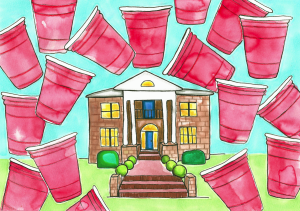Professors should update peer evaluations
April 6, 2023
As the semester comes to a close, many students will be wrapping up final projects and preparing to give presentations. With these projects usually comes one additional assignment: peer evaluations. Love them or hate them, no student can escape peer evaluations.
When used skillfully, peer evaluations are useful tools that teach students to give and receive constructive criticism. However, if this criticism is not delivered constructively, the peer evaluation process loses its utility.
Professors should consider restructuring peer evaluations – involving themselves more in the assignment. This change will enhance overall class takeaways while maintaining a cooperative environment closely resembling the workplace.
Physics graduate student Ilya Beskin teaches a physics lab that implements a direct form of feedback for end-of-year presentations. This evaluation is entirely student-led — essentially rendering the assignment useless.
“Most students, just for camaraderie sake, will give 100% to all of their classmates … writing purely positive feedback, but no kind of constructive criticism,” Beskin said. “Then a small portion of the students are just very, very critical and will give a very low average grade (regardless of presentation quality).”
When students are charged with grading their peers directly, students tend to assign grades according to their personal philosophy, instead of actual merit. For some students, this means being nice and giving everyone an A, while for others it means digging into their classmates regardless of presentation quality. While it may seem harmless, this complicates the classroom environment and devalues peer assessments.
“(Peer assessments) incentivize competition…rather (than) incentivize collaboration and actually giving helpful advice,” Beskin said.
Involving professors in peer evaluations is a simple solution that presents further benefits.
Madeleine Holland, assistant professor of instruction in the department of communication studies, uses a different peer evaluation approach in her engineering communications course.
“Each student receives a score at the end of the (project), based on the scores that their teammates give to them, the score that they give themselves and the instructor’s assessment of how fair that person’s assessment of their teammates is, as well,” Holland said.
Holland’s approach is a good model for more effective peer evaluations. Preserving the professor’s role as the expert and authority in the classroom maintains normal classroom structure while enhancing peer evaluations themselves.
While students can still report group members who didn’t assist on projects and provide insightful feedback to peers, the new system prevents them from being unconstructive or vengeful.
“One of the things that I’m trying to teach is how to be a productive teammate … (while) both giving the student autonomy and protection,” Holland said.
Like any other skill, giving and receiving quality feedback takes time. Professors are here to develop students’ skills and shouldn’t write themselves out of the peer evaluation process.
This time of year presents an opportunity for professors to do some reflection of their own.
By paying close attention to how their assessments affect students, both academically and personally, professors can make peer assessments more productive and meaningful.
Ransom is a psychology junior from San Antonio, Texas.















